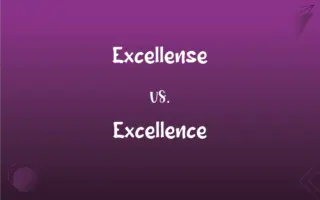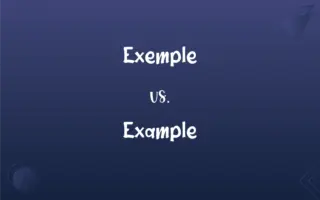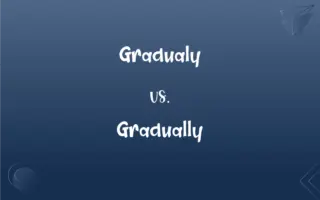Abillity vs. Ability: Mastering the Correct Spelling
Edited by Aimie Carlson || By Janet White || Published on March 26, 2024
"Abillity" is an incorrect spelling; the correct spelling is "ability," which refers to the possession of skills or talent to perform a task.

Which is correct: Abillity or Ability
How to spell Ability?

Abillity is Incorrect

Ability is Correct
ADVERTISEMENT
Key Differences
Remember that "ability" has only one 'b', just like "agility," both indicating capability.
After 'b', it's 'i' in "ability," like in "visibility," indicating clarity or recognition.
"Ability" contains double 'l', similar to "all," representing fullness or completeness in skill.
Associate "ability" with "stability," both suggesting a reliable or steady capacity.
Think of 'ability' as your skill 'bill' – you only need to pay (use) one 'b'.
ADVERTISEMENT
Correct usage of Ability
She doubted her own abillity to complete the task.
She doubted her own ability to complete the task.
His musical abillity was recognized at a young age.
His musical ability was recognized at a young age.
Their technical abillity was crucial for the project.
Their technical ability was crucial for the project.
She has the abillity to communicate effectively.
She has the ability to communicate effectively.
The team's abillity to work together led to their success.
The team's ability to work together led to their success.
Ability Definitions
The potential or suitability for holding, containing, or performing.
The bottle's ability to retain heat surprised us.
The quality of being adequately or well qualified physically and intellectually.
Her ability in management led to her promotion.
The level of expertise or proficiency in a particular area.
His ability in chess is unmatched.
The natural aptitude or acquired proficiency to perform tasks.
His musical ability impressed everyone.
The power or right to act legally.
The contract questioned his ability to negotiate.
The quality of being able to do something, especially the physical, mental, financial, or legal power to accomplish something.
A skill, talent, or capacity
A student of many abilities.
The quality of being suitable for or receptive to a specified treatment
The ability of a computer to be configured for use as a file server. See Usage Note at able.
Ability Sentences
Her artistic ability won her the first prize.
He demonstrated his ability to solve complex problems.
Ability to learn quickly is a valuable skill.
Physical ability is important for athletes.
Her singing ability impressed everyone at the audition.
The ability to adapt is key in a fast-paced environment.
The ability to stay calm under pressure is admirable.
His ability to remember facts is astonishing.
Practicing regularly improves your ability to play an instrument.
Children show a wide range of learning abilities.
The software's ability to analyze data saved us time.
Emotional intelligence is an important ability in personal relationships.
Her ability to speak multiple languages is beneficial for her job.
The ability to write clearly is essential for communication.
The ability to empathize with others is a valuable trait.
Leadership ability is crucial for project managers.
The ability to listen is as important as the ability to speak.
The ability to think critically is valued in many professions.
The team valued her ability to make quick decisions.
Creativity is an ability that can be nurtured.
Athletes train to enhance their physical abilities.
A good teacher recognizes the abilities of each student.
Her problem-solving ability was evident in how she handled the crisis.
His technical ability sets him apart from his peers.
Cooking requires the ability to multitask effectively.
Ability Idioms & Phrases
Beyond one's ability
Something that is too difficult for someone to achieve or accomplish.
The task was beyond his ability, so he asked for help.
Within one's ability
Something that is within someone's skill set or capabilities.
Finishing the marathon was within her ability, thanks to her training.
Ability to think on one's feet
Being able to react quickly and effectively in difficult situations.
Her ability to think on her feet saved the presentation.
Test one's ability
To put someone's skills or knowledge to the test.
The challenging course was designed to test the students' abilities.
Underestimate one's ability
To undervalue someone's skills or talents.
They underestimated her ability, and she proved them wrong.
Have the ability to
Possessing the skill or talent to do something.
She has the ability to make complex concepts easy to understand.
Natural ability
Innate talent or skill that someone possesses.
His natural ability for music was apparent even in childhood.
Showcase one's ability
To demonstrate one's skills or talents.
The competition gave him a chance to showcase his ability.
Stretch one's ability
To extend oneself to improve or enhance one's skills.
The new project really stretched her ability as an engineer.
Maximize one's ability
To make the most of one's skills or talents.
The training program helped her maximize her ability in sales.
Improve one's ability
To enhance or better one's skills or talents.
She took extra courses to improve her ability in graphic design.
Question one's ability
To doubt someone's skill or talent.
Despite the setbacks, she never questioned her ability to succeed.
Ability to adapt
The skill to adjust or change according to different conditions or environments.
His ability to adapt to new cultures made him an excellent traveler.
Play to one's ability
To perform at one's best level of skill.
The coach encouraged the team to play to their ability in the final match.
Expand one's ability
To increase or broaden one's skills or talents.
Learning a new language helped him expand his ability to connect with diverse communities.
Lack the ability
Not having the skill or talent to do something.
He lacked the ability to stay focused for long periods.
Ability to lead
The skill or talent to guide or direct others.
Her ability to lead the team through difficult times was commendable.
Ability to innovate
The skill or talent to create new ideas or methods.
The company thrives because of its employees' ability to innovate.
Ability to communicate
The skill of conveying information effectively.
His ability to communicate complex ideas clearly made him a great teacher.
Assess one's ability
To evaluate someone's skills or talents.
The exam is designed to assess the students' ability in math.
FAQs
What is the root word of ability?
The root word is "habilitas" from Latin, meaning skill or aptitude.
Which vowel is used before ability?
The vowel "a" is used at the beginning of ability.
What is the verb form of ability?
Ability doesn't have a verb form; it's a noun. The verb "to be able" is related but not a form of ability.
What is the pronunciation of ability?
Ability is pronounced as /əˈbɪlɪti/.
What is the singular form of ability?
The singular form is "ability."
What is the plural form of ability?
The plural form is "abilities."
Which conjunction is used with ability?
Conjunctions aren't specifically paired with "ability," but "and" can be used when listing multiple abilities.
Is ability a noun or adjective?
Ability is a noun.
Why is it called ability?
It's called ability, deriving from the Latin term "habilitas," meaning aptitude or competence, reflecting one's capacity or skill.
Which preposition is used with ability?
Prepositions like "to" (as in ability to perform) or "of" (as in ability of a device) are used with ability.
Is ability an adverb?
No, ability is not an adverb.
Is ability a negative or positive word?
It's generally positive, as it refers to one's capacity or skill.
Which article is used with ability?
The indefinite article "an" or the definite article "the" can be used, depending on context.
Is the word ability imperative?
No, ability is not imperative; it's a noun.
Is ability an abstract noun?
Yes, ability is an abstract noun as it refers to a concept or quality, not a physical object.
Is ability a vowel or consonant?
The word itself consists of both vowels and consonants.
How do we divide ability into syllables?
Ability is divided as a-bil-i-ty.
What is a stressed syllable in ability?
The stressed syllable in ability is the second: "bil."
What part of speech is ability?
Ability is a noun.
Is ability a countable noun?
Yes, ability is a countable noun (e.g., one ability, several abilities).
Is ability a collective noun?
No, it's not typically used as a collective noun.
Is the ability term a metaphor?
It can be used metaphorically in certain contexts but is generally used in a literal sense.
What is another term for ability?
Another term for ability can be "skill," "talent," or "proficiency," depending on the context.
Which determiner is used with ability?
Determiners like "the," "an," or possessives like "his/her" ability can be used.
What is the second form of ability?
There is no second form; ability is a noun.
How many syllables are in ability?
There are four syllables in ability.
What is the first form of ability?
The first form is "ability" itself (noun form).
What is the opposite of ability?
The opposite could be "inability" or "incapacity."
What is the third form of ability?
There is no third form; ability is a noun.
How is ability used in a sentence?
"She has the ability to solve complex problems efficiently."
About Author
Written by
Janet WhiteJanet White has been an esteemed writer and blogger for Difference Wiki. Holding a Master's degree in Science and Medical Journalism from the prestigious Boston University, she has consistently demonstrated her expertise and passion for her field. When she's not immersed in her work, Janet relishes her time exercising, delving into a good book, and cherishing moments with friends and family.
Edited by
Aimie CarlsonAimie Carlson, holding a master's degree in English literature, is a fervent English language enthusiast. She lends her writing talents to Difference Wiki, a prominent website that specializes in comparisons, offering readers insightful analyses that both captivate and inform.


































































